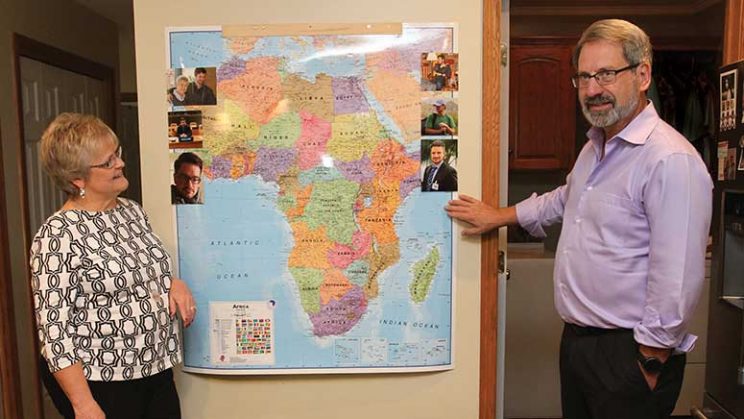Peacemaking and Justice students grapple with MJ Sharp’s death a year later
By Mackenzie Miller – Horizon Editor-in-Chief

A year after his death in the Democratic Republic of Congo, the memory of MJ Sharp lives on, not only in the hearts of his friends and family, but also on Hesston College’s campus in RELG 214, Peacemaking and Justice.
Sharp’s stories from working with both Mennonite Central Committee and, more recently, the United Nations fit in perfectly with the course description, according to professor John Sharp.
What does justice look like in this case? Sharp, bible and history professor at Hesston College and father of MJ, decided he didn’t want to wrestle with this question alone. So, why not ask his students.
“It’s a way to invite students into my story, and to share my story,” Sharp said. “It’s also a chance to use a more recent peacemaker for a case study. Much of what we study is in the past. Here is something that is new.”
For a week, students in his Peacemaking and Justice course listened, asked questions and offered up their views on justice.
Sharp watched as his students, those who had heard MJ’s story already and those who had not, shake their heads in pain and confusion as he shared details of MJ’s kidnapping and death.
But Sharp says it’s important to feel that affliction.
“I like things that come up short, capture students attention,” Sharp said. “And this seems to have done that.”
In a three-day case study, Sharp first shared MJ’s story: boredom in school, pranks on his teachers and friends, and later, finding his calling – serving the people in the Congo. But through the entire narrative, Sharp stressed that MJ was a normal human “who found passion in his mission.”
On the final day of the case study, Sharp placed MJ’s story into the hands of the students.
Sharp, along with his wife Michele, had already spent many months wrestling with what justice looks like for their son and for the Democratic Republic of Congo. Now, Sharp asked for new insight into a complicated and still mysterious situation. After all, investigations by the United States and the United Nations still press on: Who is responsible for the death of MJ and his coworker, Zaida Catalan? What next? Why is the DRC President being so difficult?
“What I really want to do is sit down with President Kabila and say, ‘Kabila, my son died for your country. Look us in the eyes. Would you please cooperate with the investigation?’” Sharp said.
A course objective of Peacemaking and Justice is the challenge to think creatively. But that’s easier said than done with a story so close to home: Sharp notes many of his students were around last year when this event took place. Some had already left for spring break, while others heard the news of MJ’s disappearance in chapel. A prayer vigil took place on March 23, 2017. And later, when his death was confirmed, students attended MJ’s memorial service.
Those flashbacks remain vivid in students’ minds “So what would you do? What does justice look like?” Sharp said.
“A formal apology from the people who were responsible,” freshman Jared Schlabaugh suggested. “You can say you’re sorry to a sheet of paper, but a human is more personal than a sheet of paper.”
“Seems like the guilty party should continue the work of MJ and Zaida,” sophomore Jeff Kauffman added.
“No matter what anyone says to you, his death will never be justified,” sophomore Noah Yoder said. “That’s what makes answering this question so difficult. No matter what, there will never be full justice here on Earth.”
Sharp said it’s therapeutic to talk about MJ’s story. He finds the array of responses intriguing.
As peacemakers, “It would be ironic for us to push for [a resolution] that is violent when MJ’s life was about bringing peace and harmony,” Sharp said. “I can’t imagine he would want that. I’m sure of it.”
And as MJ became a part of the week, sophomore Joy Driver reflected, “You would want to do what you know MJ would want you to do.”
What exactly is that? Sharp has a good idea.
“I think he would say, ‘There is so much more to be done. Will you guys step up? Doesn’t have to be to Africa, but step up, stand between the breach of people who are alienated. Stand as advocates for people who are immigrants. Stand between two people who hate each other.’”



